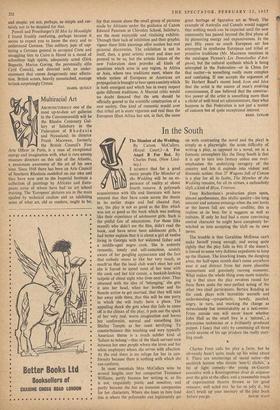In the South
I SUSPECT that for a good many people The Member of the Wedding will be an ex- perience of reality at about fourth remove. A polymath acquaintance with life and literature will have ensured that they have come across the theme in its earlier stages and feel cheated that, say, the play is not as good as the film which was not as good as the book which was nothing like their experience of adolescent girls. Such is the pitiful fate of adaptations. For those (like myself) who didn't see the film, didn't read the book, and have never been adolescent girls, I had better explain that it is about a girl of twelve living in Georgia with her widowed father and a middle-aged negro cook. She is ardently romantic, lonely and self-conscious, acutely aware of her gangling appearance and the fact that nobody seems to like her very much, so much so that the local club won't elect her and she is forced to spend most of her time with the cook and her kid cousin, a bookish-looking tadpole of about eight who lives next door. Thus obsessed with the idea of 'belonging,' she gets it into her head, when her brother and his fiancee arrive to get married, that they will take her away with them, that this will be one party in which she will really have a place. The appalling shock she gets when this fails to come off is the climax of the play; it puts out the spark of her very real, warm imagination and leaves her conformist, normal and something like Shirley Temple at her most terrifying. To counterbalance this touching and very typically American theme is a much subtler kind of `failure to belong'—that of the black servant torn between her own people whom she loves and her white employers whom she serves with affection. At the end there is no refuge for her in con- formity because there is nothing with which she can conform.
In most essentials Miss McCullers wins by several lengths over her compatriot Tennessee Williams, partly because her writing is, as his is not, exquisitely poetic and sensitive, and partly because she has an immense compassion for her characters. Where she loses to him (and this is where the polymaths can legitimately get on with contrasting the novel and the play) is simply as a playwright; the acute difficulty of writing a play, as opposed to a novel, set in a fantastic atmosphere like the Deep South is that it is apt to turn into fantasy unless one over- emphasises the underlying savagery of the country and lets it explode into violent and dramatic action; thus 27 Wagons full of Cotton is a play for all its faults, The Member of the Wedding remains, for all its virtues, a melancholy idyll, a kind of Hiya, 7'ristesse.
Tony Richardson's production plays upon, almost apotheosises, this idyllic quality—his long summer and autumn evenings when the owl hoots or the leaves fall are utterly credible; this is realism at its best, for it suggests as well as imitates. If only he had had a more convincing central character he might have completely be- witched us into accepting the idyll on its own terms.
The trouble is that Geraldine McEwan can't make herself young enough, and seeing quite rightly that the play falls to bits if she doesn't, is forced to some very dubious expedients to keep up the illusion. The knocking knees, the dangling arms, the half-open mouth don't come anywhere near it and distract from her more plausible mannerisms and genuinely moving moments. What makes the whole thing even more tantalis- ing is that since the play revolves round her these flaws undo the near-perfect acting of the other two chief participants. Bertice Reading as the cook plays with incredible warmth and understanding—sympathetic, bawdy, puzzled, angry, in turn, and marking the change as miraculously but unmistakably as a taxi-meter. From outside one will never know whether John Hall as the small boy is a `natural,',, a precocious technician or a brilliantly produced puppet. 1 fancy that only by combining all three could anyone of his age produce the really start- ling result.
Charles Fenn calls his play a farce, but he obviously hasn't quite made up his mind about it. There are smatterings of social satire—the snobbish hostess who detests `non-U cliches,' a bit of light comedy—the young ex-Guards executive with a Kensingtonian droit de seigneur over the girls at the office, and a reasonable touch of experimental theatre thrown in for good measure; well acted too. So far so jolly d., but don't brush up your memory of the joke book


































 Previous page
Previous page